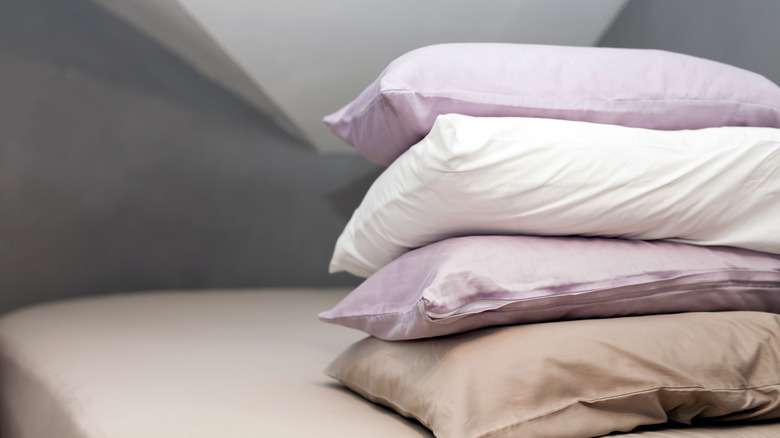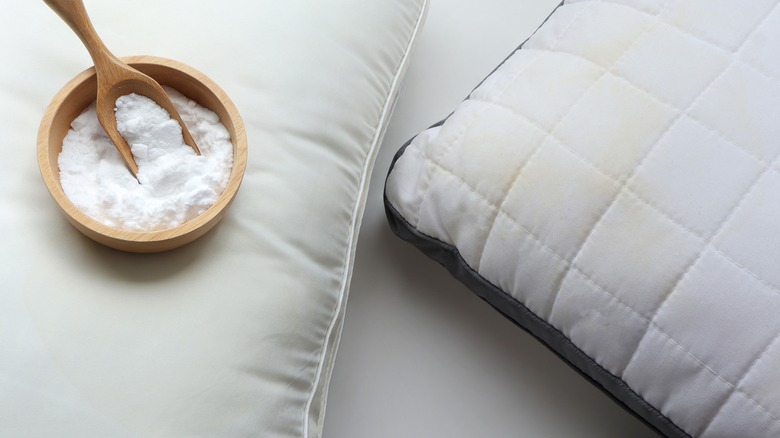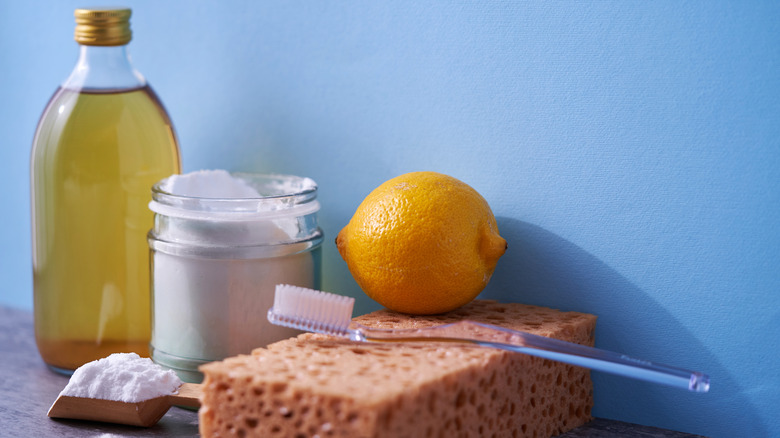Try This Simple Method To Get Smoke Smells Out Of Your Pillows
Smoke smells can linger in your pillows long after lighting up a cigarette in your bedroom. Or perhaps you're struggling with fire fumes that just won't leave your innermost sanctuary. Second and thirdhand smoke have serious impacts on your health, and the aerosols can also negatively impact your home's resale value. Eliminating these odors is essential not only for your comfort but also your well-being. One popular method to treat stinky rooms is to blast them with ozone since it neutralizes the scent molecules in the air. While professional ozone treatments are highly successful, they also pose certain health risks, and residents need to wait until the space has been aired out sufficiently before returning to their home. Thermal fogging is another commercial method for removing noxious fumes from your home. But both these options can be a bit pricey, with costs ranging from $200 to $600, per Forbes. Luckily, there are cost-effective techniques to rid your pillows of smoke smells using common household items.
While these methods are simpler and cheaper than commercially-used alternatives, they are just as effective. Baking soda and vinegar are two powerful everyday staples that will deodorize your pillows, linens, and even the curtains in the room. The reason they are so potent comes down to science and how they react with smoke molecules. Let's break down why bicarbonate of soda and acetic acid are stench-busters, and how you can boost their efficacy.
The power of baking soda in neutralizing overpowering scents
There are an abundance of clever ways to use baking soda for a cleaner kitchen, and many work because of its odor-absorbing properties. Chemically, sodium bicarbonate is amphoteric and works by neutralizing acids and bases, often the source of bad odors. The soot residue of smoke is acidic, and when combined with baking soda the two form a neutral-smelling sodium salt, per a report in the Journal of Investigative Dermatology. The acid's pH is effectively altered so that the smell is less rancid, reducing the smoky fragrance. As reported by The New York Times, baking soda's neutralizing effect on acidic gas was seen when smokestacks and flues were treated with sodium bicarbonate in the 1990s, resulting in less acid rain.
To use baking soda on your pillows, sprinkle a generous amount over the surface and let it sit for several hours or overnight. This allows the baking soda to absorb the smoke odor effectively. Afterward, vacuum the pillows thoroughly to remove any residue. You can also add a few drops of essential oils to the baking soda before you apply it to your headrests. Essential oils add a pleasant fragrance, and some also have antimicrobial properties that can help further neutralize odors. Lavender, eucalyptus, cinnamon, and tea tree oil are potent, scientifically proven choices.
Vinegar and lemon juice are a powerful combination
Vinegar, known for its cleaning properties, is also excellent at eliminating smoke odors. Acetic acid, its active ingredient, helps to lift the residue left by smoke, breaking down the molecules that cause the smell. Just add 1 cup into the washer with your laundry and you're good to go. Alternatively, if you want a faster cleaning tip that makes your bed smell amazing, mix equal parts white vinegar and water in a spray bottle and lightly mist the pillows with the solution, ensuring they are damp but not soaked. The vinegar will work to neutralize the smoke odor as it dries.
To enhance its effectiveness, consider adding a bit of lemon juice to the mixture. The citric acid in lemon juice can help break down stubborn odor molecules, while the fresh scent masks any remaining vinegar smell. "Citric acid and vinegar are both acids, but citric acid is also a mild reducing agent, meaning it can do chemistry that acetic acid (vinegar) cannot," explained Professor Eric Beckman from the University of Pittsburgh Swanson School of Engineering. "Reducing agents like citric acid can actually 'denature,' or unravel, proteins — including proteins that make viruses function." So, mixing vinegar with lemon juice could also help destroy viruses in your pillows, an effective two-for-one punch. After applying the solution, allow the pillows to air dry completely before using them again — they'll smell fresh, clean, and guest-ready.


